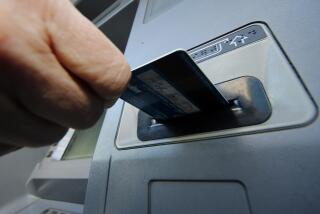2 Counterfeiting Suspects Denied Rights, Judge Says
- Share via
Two men accused of heading the richest counterfeiting operation in U.S. history were denied their right to legal counsel, jeopardizing the government’s ability to use $14 million in bogus money seized after their arrest as evidence against them, a Los Angeles federal court judge ruled Tuesday.
But U.S. District Judge Andrew A. Hauk rejected the two men’s claim that Secret Service agents had promised them a lenient sentence when they gave up their right to call in attorneys during questioning.
Wick A. Helmandollar, 40, of Salmon, Ida., and Harold Cooper, 56, of Buena Park, arrested Feb. 5 when they attempted to sell $3.7 million in bogus currency to a government informant, pleaded guilty to counterfeiting charges Tuesday, but said they would appeal Hauk’s ruling on the alleged plea bargain.
Request for Attorney
At issue were Helmandollar’s claims he had repeatedly asked for an attorney when Secret Service agents interrogated him after his arrest, but was provided with only a telephone and phone book.
In a declaration filed with the court, Helmandollar said he was told by a Secret Service agent: “All right . . . Call a (expletive deleted) attorney. You think one will come down at this hour of night? How much money do you have in your wallet--$200, $300? You think they give a (expletive deleted)? We’re the only ones who can help you now.”
Helmandollar claims he and Cooper were then promised they would receive no jail time if they told government agents the location of their printing plates and an additional $17.7 million that was eventually seized from warehouses in Buena Park and Salmon, Ida. They complied only with that understanding, they said.
Secret Service agents testified Tuesday there had been no such agreement made. Helmandollar was provided with “an opportunity” to consult an attorney by telephone.
Miranda Violation
“I think there’s no question that there was a violation of the Miranda ruling,” Hauk said of the failure to provide Helmandollar with an attorney.
While the judge found the government had made no commitment on a plea bargain, he said it is possible the evidence seized as a result of information provided by the two men--the additional $17.7 million in bogus money and the printing equipment--may not be admissible in determining sentence for the two men.
That issue will be resolved during sentencing, set for June 1.
More to Read
Sign up for Essential California
The most important California stories and recommendations in your inbox every morning.
You may occasionally receive promotional content from the Los Angeles Times.









